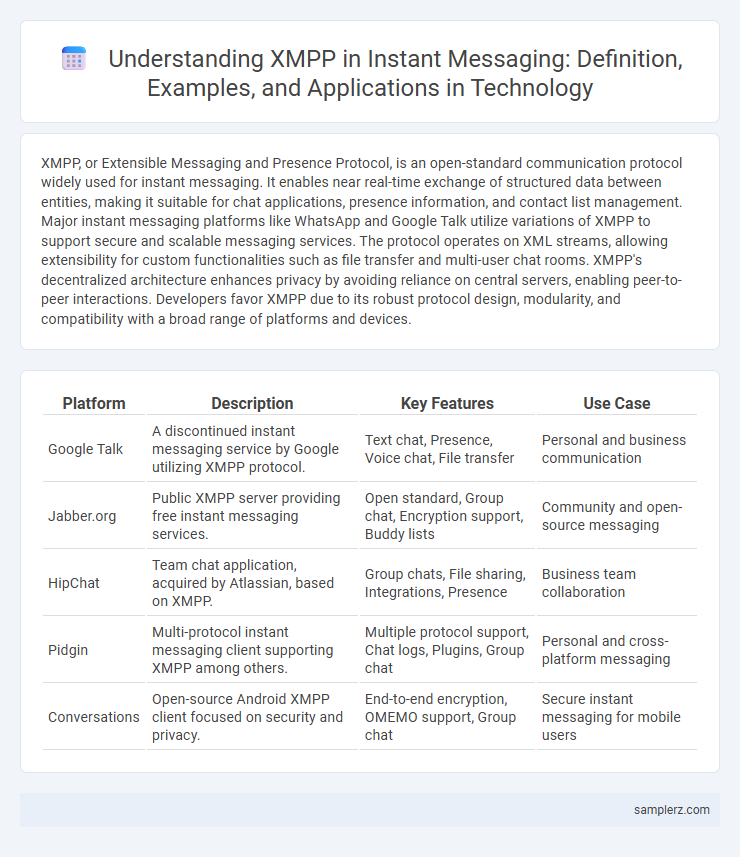XMPP, or Extensible Messaging and Presence Protocol, is an open-standard communication protocol widely used for instant messaging. It enables near real-time exchange of structured data between entities, making it suitable for chat applications, presence information, and contact list management. Major instant messaging platforms like WhatsApp and Google Talk utilize variations of XMPP to support secure and scalable messaging services. The protocol operates on XML streams, allowing extensibility for custom functionalities such as file transfer and multi-user chat rooms. XMPP's decentralized architecture enhances privacy by avoiding reliance on central servers, enabling peer-to-peer interactions. Developers favor XMPP due to its robust protocol design, modularity, and compatibility with a broad range of platforms and devices.
Table of Comparison
| Platform | Description | Key Features | Use Case |
|---|---|---|---|
| Google Talk | A discontinued instant messaging service by Google utilizing XMPP protocol. | Text chat, Presence, Voice chat, File transfer | Personal and business communication |
| Jabber.org | Public XMPP server providing free instant messaging services. | Open standard, Group chat, Encryption support, Buddy lists | Community and open-source messaging |
| HipChat | Team chat application, acquired by Atlassian, based on XMPP. | Group chats, File sharing, Integrations, Presence | Business team collaboration |
| Pidgin | Multi-protocol instant messaging client supporting XMPP among others. | Multiple protocol support, Chat logs, Plugins, Group chat | Personal and cross-platform messaging |
| Conversations | Open-source Android XMPP client focused on security and privacy. | End-to-end encryption, OMEMO support, Group chat | Secure instant messaging for mobile users |
Introduction to XMPP in Instant Messaging
XMPP (Extensible Messaging and Presence Protocol) is a widely-used open standard for instant messaging that enables real-time communication and presence information exchange. It supports secure, decentralized messaging through XML streams, allowing interoperability across various chat clients and servers. Companies like Google Talk and WhatsApp have leveraged XMPP for scalable, extensible messaging solutions in their platforms.
Core Features of XMPP for Chat Applications
XMPP (Extensible Messaging and Presence Protocol) enables real-time, decentralized instant messaging through core features such as presence information, which allows users to see who is online and available. It supports extensible XML-based messaging, providing secure, structured communication and compatibility with various devices and platforms. Reliable message delivery, including offline message storage and multi-user chat rooms, enhances user experience in chat applications.
Popular Instant Messaging Apps Using XMPP
Popular instant messaging apps using XMPP include WhatsApp, which leverages the protocol for its decentralized messaging infrastructure, and Jabber, known for its open-source XMPP client features. Google Talk, before being integrated into Google Hangouts, also utilized XMPP to enable real-time communication. XMPP's extensibility and security have made it a preferred choice for apps requiring robust, scalable messaging solutions.
Real-Time Message Delivery with XMPP
XMPP (Extensible Messaging and Presence Protocol) enables real-time message delivery by maintaining persistent XML streams between clients and servers, ensuring instant data exchange with minimal latency. Its decentralized architecture supports scalable and efficient communication, allowing seamless presence information updates and immediate message pushing. This protocol's robust encryption and extensibility make it ideal for secure, timely communication in instant messaging applications.
Group Chat Implementation via XMPP
XMPP (Extensible Messaging and Presence Protocol) facilitates real-time group chat by utilizing Multi-User Chat (MUC) extensions that allow participants to join, communicate, and manage chat rooms effectively. This protocol supports features like presence awareness, message archiving, and role-based permissions, enabling scalable and secure group conversations. Popular messaging platforms leverage XMPP MUC to deliver synchronized group messaging with support for encrypted communication and offline message delivery.
XMPP Security Protocols in Instant Messaging
XMPP employs robust security protocols such as TLS (Transport Layer Security) to encrypt data in transit, ensuring confidentiality and integrity during instant messaging. SASL (Simple Authentication and Security Layer) enhances authentication mechanisms, preventing unauthorized access and impersonation. Furthermore, end-to-end encryption extensions like OMEMO provide users with secure communication channels, safeguarding messages from interception and eavesdropping.
Extending Functionality: XMPP Plugins and Extensions
XMPP enhances instant messaging functionality through diverse plugins and extensions like Multi-User Chat (MUC) for group conversations, file transfer protocols such as XEP-0234 for seamless sharing, and message archiving extensions like XEP-0313 that enable efficient conversation history management. Custom XMPP modules facilitate integration with external services, boosting interoperability in enterprise communication systems. These extensibility features make XMPP a flexible solution for scalable and customizable instant messaging platforms.
Cross-Platform Messaging with XMPP
XMPP enables seamless cross-platform messaging by supporting real-time communication across diverse devices and operating systems such as iOS, Android, Windows, and Linux. Its decentralized architecture and standardized protocols allow interoperability between various instant messaging clients, enhancing user connectivity without platform limitations. Major messaging applications like WhatsApp and Jabber utilize XMPP to provide secure, scalable, and extensible chat services across multiple devices.
XMPP Integration in Enterprise Communication
XMPP (Extensible Messaging and Presence Protocol) enables secure, real-time messaging and presence information critical for enterprise communication systems. Integration of XMPP in corporate environments supports scalable, interoperable chat platforms with robust features like group messaging, file transfer, and presence indicators. Enterprises leverage XMPP to enhance collaboration, streamline communication workflows, and maintain compliance through end-to-end encryption and open-standard extensibility.
Future Trends of XMPP in Instant Messaging
XMPP (Extensible Messaging and Presence Protocol) is evolving to support decentralized messaging systems, enhancing privacy and data ownership in instant messaging applications. Future trends emphasize integration with AI-driven chatbots and real-time multimedia communication, improving user interaction and experience. Increased adoption of XMPP in IoT ecosystems will enable seamless device-to-user and device-to-device messaging with secure, scalable protocols.

example of XMPP in instant messaging Infographic
 samplerz.com
samplerz.com